|
|
|
Sort Order |
|
|
|
Items / Page
|
|
|
|
|
|
|
| Srl | Item |
| 1 |
ID:
178376
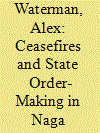

|
|
|
|
|
| Summary/Abstract |
The 1997 Indo–Naga ceasefire is one of the world’s longest truces. Although formally-agreed rules technically regulate the state-rebel relationship, the rules themselves and their applicability beyond the Indian state of Nagaland are ambiguous and open to interpretation. Far from static, the ceasefire represents an evolving cluster of ‘armed orders’ oscillating between coexistence and limited conflict [Staniland, Paul. “Armed Politics and the Study of Intrastate Conflict,” Journal of Peace Research 54, no. 4 (July 1, 2017): 459–67. doi:10.1177/0022343317698848]. Indian state actors display intriguing variations in their approaches towards these orders, from restraint and de-escalation in some circumstances to aggressive local counterinsurgency in others. To date, however, existing research on order within ceasefires focus on rebel perspectives. Building on existing efforts to reconceptualise ceasefires as arenas in which political order is negotiated and constructed, this article re-introduces the state’s role in order-making, locating these processes within wider rebel and non-state attempts to do so. Analysing armed orders in the Naga ceasefire, it reveals a fascinating spectrum of bargaining, signalling and negotiation over the formal and informal rules of armed orders. This challenges the notion that ceasefires simply lock in state-armed group orders, but instead create new spaces for armed order’s renegotiation.
|
|
|
|
|
|
|
|
|
|
|
|
|
|
|
|
| 2 |
ID:
154774


|
|
|
|
|
| Summary/Abstract |
Counterinsurgency (COIN) has long been recognised as a political phenomenon, but current theoretical understandings of politics in COIN reflect ideal types, overlooking the depth and complexity of the politics of insurgency and COIN. Drawing from India’s experience in its northeastern region, this article argues that COIN theory overlooks the political agency and multiplicity of actors, as well as overlooking the fundamentally political scope of interactions that take place between them. It calls upon COIN theorists to begin to map out this complex picture by urging greater integration between academics and practitioners studying COIN and theoretical inputs from wider academic disciplines.
|
|
|
|
|
|
|
|
|
|
|
|
|
|
|
|
| 3 |
ID:
179306
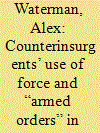

|
|
|
|
|
| Summary/Abstract |
Recent works have highlighted deeply political variations in Indian counterinsurgency across space and time, leading to the emergence of a diversity of “armed orders” ranging from outright clashes to openly cooperative state-insurgent relationships. However, we know little about how variations in counterinsurgency strategy, particularly in the levels of force employed, shape the functioning of these armed orders. Drawing on original case study evidence from the Naga insurgency, this article builds on existing works on state-insurgent orders by developing a typology of variations in the use of force, accounting for counterinsurgents’ use of force to undermine, modify and uphold a patchwork of complex and fragile state-insurgent orders across space and time in India’s Naga conflict. In doing so, it contributes to debates on the use of force in counterinsurgency and the study of order in conflict in India’s Northeast.
|
|
|
|
|
|
|
|
|
|
|
|
|
|
|
|
| 4 |
ID:
184456
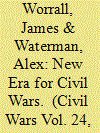

|
|
|
|
|
| Summary/Abstract |
In 2023, Civil Wars will achieve the milestone of its 25th anniversary. Since it was first formed by Caroline Kennedy-Pipe, Clive Jones and others at the University of Leeds back in 1998, the journal has published a broad and diverse range of articles related to the pressing global challenge of intrastate conflict, its causes, dynamics, effects and the responses it has engendered. Over its history, the journal has built a reputation as a specialist outlet for high-quality, interdisciplinary research, in particular on the causes, nature, triggers, dynamics, intensity, termination and the recurrence of civil war, covering a wide range of conflicts across the globe in its pages. We would like to take the opportunity presented by the publication of Vol. 24, No. 1 (2022) to introduce ourselves and outline our editorial vision for the coming years, if that is perhaps not too grand a term.
|
|
|
|
|
|
|
|
|
|
|
|
|
|
|
|
| 5 |
ID:
189358
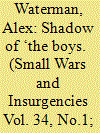

|
|
|
|
|
| Summary/Abstract |
This article leverages data from an oft-overlooked case of rebel governance – India’s United Liberation Front of Assam (ULFA) – to demonstrate the importance of de-centring territorial control as a prerequisite for rebel governance. ULFA neither controlled territory nor developed formalised bureaucratic institutions, yet its ‘parallel government’ held considerable sway over Assamese public life during 1985–1990, underpinned by its social embeddedness, influence upon media discourse and crucially its subversion of state structures, until its ability to limit state repression collapsed. The rise and fall of ULFA’s rebel governance illustrates the hybrid socio-political terrain upon which rebel governance is often laid.
|
|
|
|
|
|
|
|
|
|
|
|
|
|
|
|
| 6 |
ID:
179930
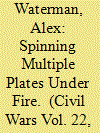

|
|
|
|
|
| Summary/Abstract |
Order informs an actor’s context, studying order and accounting for the rules and relationships underpinning that order can tell us a great deal about how power and authority is constructed, renegotiated and contested. Order represents a promising prism and field of study for understanding civil wars. This article begins by assessing the ‘order turn’ in the literature over the past decade. From this basis we identify four key areas that represent important elements within the new ordering agenda that promise to add significantly to the study of order within the discipline. These include: 1) Mapping order(s) to better account for their complexity, especially by disaggregating internal orders within institutions and organisations; 2) Recognising civilians as individual and collective agents, moving beyond the civilians-as-victims paradigm to demonstrate how civilian action shapes order, forcing both rebel groups and governments to adapt; 3) Exploring the social mechanisms that reinforce order, thus moving the discussion beyond violence and political orders and towards a more holistic perspective; 4) Understanding that all orders are mutually constituted and thus understanding not only how order is expressed or acted upon but also how order is understood, how assumptions about order influence action, and crucially, how each group’s actions are shaped by the generation of knowledge about the order they inhabit. Using these we highlight both the promise of the concept of order for the study of civil wars and attempt to begin the development of a coherent research agenda to unify existing insights and lay the foundations for further advances.
|
|
|
|
|
|
|
|
|
|
|
|
|
|
|
|
|
|
|
|
|